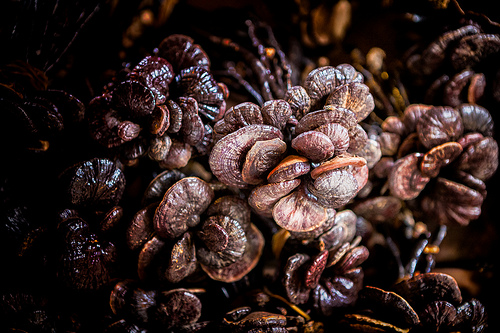
‘Purple Ganoderma,’ by See-ming Lee [flickr.com/seeminglee]. License https://creativecommons.org/licenses/by-nc/2.0/
While laws and social stigmas limit the use of psychedelics, there is an alternative substance you can freely consume that can aid contemplation. And you can do so without jail time, or excommunication from your social niche. The herb–or mushroom–is reishi (Chinese name: ling zhi), and it is classified as an adaptogen.
Adaptogens are herbs that help us manage our response to stress. The stress may be mental, emotional or physical. These herbs are anti-inflammatory, antioxidant, antibacterial, antiviral, or anti-tumor. They balance hormones, enhance immunity, calm anxiety, or uplift depression. They enhance cellular respiration (oxygen uptake) for increased energy production. In scientific summary, they regulate the neuroendocrine-immune system.
All adaptogens exhibit at least one of the above attributes, and most exhibit a combination of several. All are also safe for long-term use and supported by a significant volume of research as well as millennia of clinical use, mainly in Ayurveda and Chinese Medicine. While the agelong use of these herbs is a testament to their safety and efficacy, new uses for them continue to be found as modern diseases emerge.
Of all the adaptogens, reishi is the sole “soul-searching” herb. By “soul-searching,” I am not alluding to religion but spirituality, or—in a more secular tone—existentialism. In this regard, we are capitalizing on the herb’s ability to promote mental clarity and calm the mind. (In Chinese Medicine, there is no division between spirit and mind.)
Ling zhi can be translated as “spirit plant” or “divine fungus,” and the mushroom has been used through the ages by Taoists, monks, and other spiritual seekers to support a meditative life. In the Chinese Medicine pharmacopeia, it:
- Nourishes the heart and calms the spirit
- Stops coughing and wheezing
- Tonifies qi and nourishes blood
It can be used for insomnia, fatigue, poor appetite, or lung disorders. It is also considered a longevity herb. It was first listed in the Shen Nong Ben Cao Jing (Divine Husbandman’s Materia Medicia), which was written sometime shortly after the Han Dynasty (ending 220 CE). There, it is classified as a superior herb, meaning that it nourishes life and is very safe to use.
If existentialism is not your thing, you may jump ahead to Adaptogenic Properties of Ling Zhi for modern herbal applications. However, if you want to nourish your shen (i.e. spirit, but not your Catholic soul), then read on for the Shen-Nong-Ben-Cao-Jing elucidation…
Ling Zhi in the Shen Nong Ben Cao Jing
The SNBCG lists six types of ling zhi: blue/green, red, yellow, white, black and purple. They all have similar properties for nourishing life, but are individually characterized by distinct mental-emotional effects. These are summarized in David Winston’s book, ‘Adaptogens: Herbs for Strength, Stamina and Stress Relief.’
- Blue/green reishi calms the spirit and “helps a person become more compassionate.”
- Red reishi improves cognitive function.
- Yellow reishi “helps a person become loyal, honest, and relaxed.”
- White reishi quiets the mind and “gives fortitude and bravery.”
- Black reishi isn’t attributed specific mental-emotional effects, but strengthens the kidney system which traditionally corresponds to will power.
- Purple reishi (pictured above) “protects the shen [spirit], and prevents senility.”
Adaptogenic Properties of Ling Zhi
Ling zhi’s adaptogenic properties include:
- strengthening the immune system
- enhancing cardiovascular function
- anti-tumor
- anti-inflammatory
- antiviral
In China it is used in fu zheng therapy during cancer treatment. Fu zheng means “to support normal qi.” It is a therapeutic approach that focuses on strengthening the body and building its resistance to disease, rather than attacking disease directly. In integrative cancer treatment, while chemo- or radiation therapy aggressively attacks the cancer, fu zheng treatments protect the body and counter the side-effects of chemo and radiation.
On Meditation and Psychedelics
The path to enlightenment is infinite, and open for travel as far as you are willing to go. Meditation is the guide along the path.
Take a few steps in meditative thought and you may feel at peace, and choose to stay there. If you walk further, you will leave the comfort of peace, and explore hatred, envy, fear and/or other negative emotions that characterize the human condition. But your journey will be more complete, for you have chosen not to repress existing emotions. Thus, your path becomes winding, as you weave through peace and conflict.
Way, way down the path you will touch upon the place you started. You will realize you haven’t been moving forward, winding along. For you will have reached the point of infinite oneness, where everything moves together, and relativity is lacking.
Psychedelics may do this mind-work for you, as a shortcut to heightened sensory awareness. But it is a shortcut through Wonderland, where you can easily get lost. Ling zhi, in contrast, will help you do the enlightening mental work yourself while retaining logic and opening your mind to intuitive clarity.
Carl is a former engineer who applies rational thought to the often subjective nature of traditional healing. He practices acupuncture in San Diego, CA.
